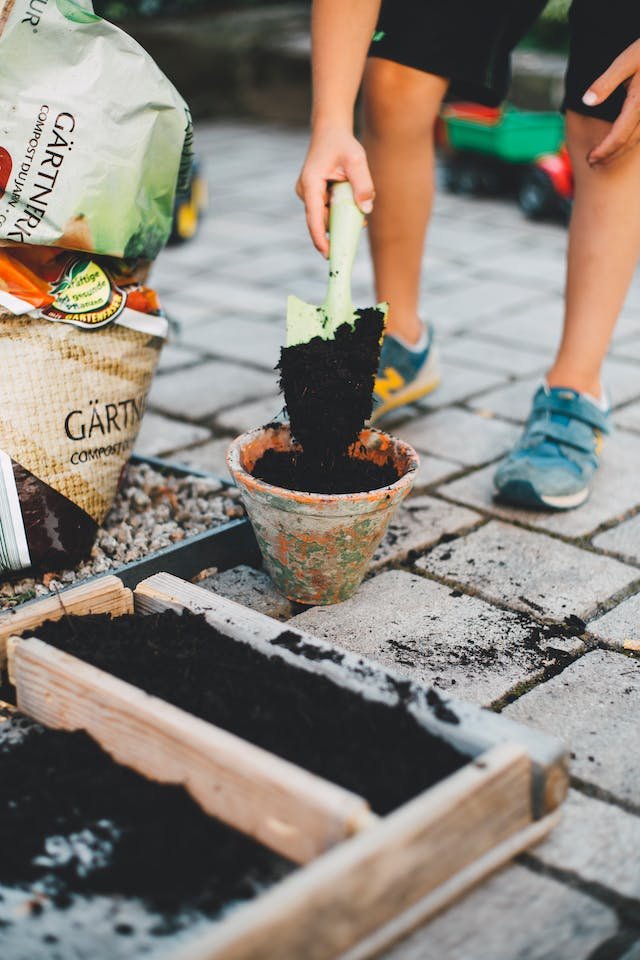
Benefits of Organic Gardening: Delve into the numerous advantages of adopting an organic gardening lifestyle, including healthier produce, improved soil fertility, and reduced environmental impact. Discuss how organic gardening contributes to biodiversity and the preservation of ecosystems.
Creating Your Organic Oasis
Planning Your Garden: A successful organic garden starts with thoughtful planning. Discuss the importance of choosing the right location, understanding sunlight requirements, and designing a garden layout that maximizes space and efficiency.
Soil Health and Composting: Explore the key role of soil in organic gardening. Highlight the benefits of composting, cover cropping, and other techniques to enhance soil fertility naturally. Provide practical tips for creating nutrient-rich compost at home.
Planting with Purpose
Companion Planting:
Explore the concept of companion planting, where specific plants are grown together to enhance each other’s growth and deter pests. Provide a comprehensive guide on pairing compatible plants and maximizing the benefits of this natural gardening lifestyle strategy.
Nurturing Your Garden
Water Conservation:
Address the importance of responsible water usage in organic gardening. Discuss techniques such as rainwater harvesting, mulching, and efficient irrigation systems to minimize water waste and promote sustainability.
Organic Pest Control:
Explore natural methods of pest control without resorting to harmful chemicals. Introduce beneficial insects, companion plants, and other organic strategies to keep pests at bay while maintaining a healthy ecosystem.

Embracing a Gardening Lifestyle
Mindful Living:
Connect the dots between gardening and mindfulness. Discuss how the act of gardening can serve as a therapeutic practice, promoting mental well-being and stress relief.
Community and Sharing:
Explore the communal aspects of gardening, including community gardens, local farmers’ markets, and sharing excess produce with neighbors. Highlight the social benefits of connecting with like-minded individuals who share a passion for organic living.
Seasonal Wisdom
Understanding Seasonal Planting: Explore the importance of aligning your gardening activities with the natural rhythms of the seasons. Discuss the benefits of planting certain crops during specific times of the year and how this practice enhances overall garden productivity.
Seasonal Eating:
Extend the conversation to the kitchen by emphasizing the joys of seasonal eating. Discuss how harvesting and consuming fruits and vegetables in their peak season not only enhances flavor but also supports local agriculture and reduces the carbon footprint associated with food transportation.
Sustainable Garden Practices
Permaculture Principles:
Introduce the principles of permaculture, a design system that mimics natural ecosystems to create self-sustaining gardens. Discuss concepts like stacking functions, using renewable resources, and fostering diversity to build a resilient and sustainable garden ecosystem.
Zero-Waste Gardening:
Address the issue of waste in gardening by promoting a zero-waste mindset. Discuss composting techniques for kitchen scraps, utilizing every part of harvested plants, and minimizing the use of disposable materials in the garden.
Education and Empowerment
Gardening as a Learning Tool:
Highlight the educational benefits of gardening, especially for children. Discuss how cultivating a garden fosters a sense of responsibility, patience, and an understanding of natural processes. Explore the potential for school and community gardens to serve as valuable educational resources.
Empowering Through Knowledge:
Advocate for the sharing of gardening knowledge and skills. Discuss the importance of mentorship, workshops, and online platforms where seasoned gardeners can empower newcomers with the tools and knowledge needed to embark on their organic gardening lifestyle journey.
The Future of Organic Gardening
Technology and Innovation:
Explore how technology can complement traditional gardening practices. Discuss innovations such as smart irrigation systems, soil sensors, and gardening apps that empower individuals to make informed decisions and enhance their gardening experience.
Addressing Global Challenges:
Connect the organic gardening lifestyle to broader global challenges, such as climate change and food security. Discuss how small-scale, sustainable gardening practices can contribute to a more resilient and secure food system for communities worldwide.
Designing Aesthetic and Functional Gardens
Aesthetics in Organic Gardening:
Explore the creative side of organic gardening by discussing how aesthetics can be seamlessly integrated into functional garden design. Highlight the beauty of diverse plant varieties, incorporating artistic elements like paths, arbors, and decorative containers to enhance the visual appeal of your organic oasis.
Container and Vertical Gardening:
Extend the conversation to alternative gardening methods, such as container and vertical gardening. Discuss how these approaches are not only space-efficient but also offer unique opportunities for creativity and experimentation in smaller living spaces.
Connecting with Wildlife
Creating Wildlife-Friendly Gardens:
Emphasize the importance of biodiversity by attracting and supporting local wildlife in your garden. Discuss how planting native species, providing water sources, and creating habitat-friendly spaces contribute to a balanced and thriving ecosystem.
Beekeeping and Pollinator Gardens:
Delve into the critical role of pollinators in organic gardening. Discuss the benefits of establishing pollinator-friendly gardens and explore the world of beekeeping as a rewarding and sustainable addition to the gardening lifestyle.
Preserving Harvests and Seed Saving
The Art of Preserving:
Discuss the art of preserving your garden’s bounty through techniques such as canning, drying, and fermenting. Explore how preserving allows you to enjoy the fruits of your labor throughout the year while reducing food waste.
Seed Saving for Sustainability:
Highlight the importance of seed saving in maintaining biodiversity and preserving heirloom varieties. Discuss the process of collecting, storing, and sharing seeds to contribute to the resilience of our global seed heritage.
Social Impact and Advocacy
Community Gardens and Urban Green Spaces: Explore the social impact of community gardens and urban green spaces. Discuss how these initiatives not only promote sustainable living but also create hubs for social interaction, education, and empowerment within neighborhoods.
Advocating for Sustainable Practices:
Encourage readers to become advocates for sustainable gardening practices on a larger scale. Discuss the potential impact of individual choices on local and global ecosystems, and explore ways to promote sustainable gardening policies in communities.






